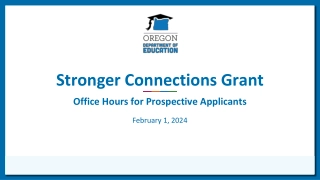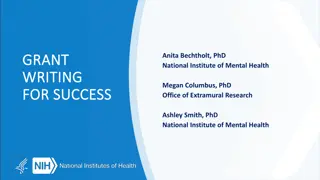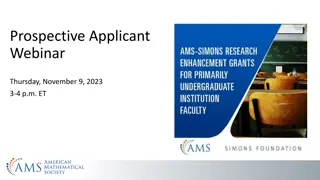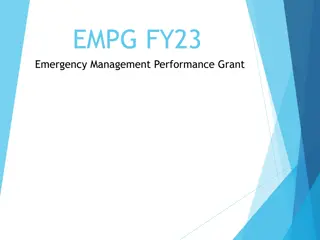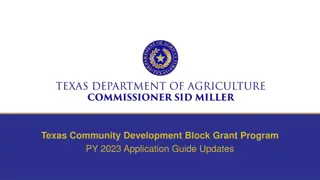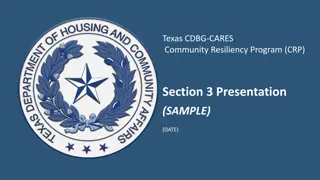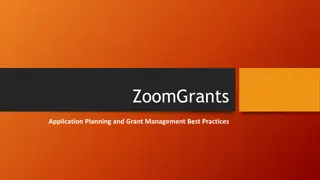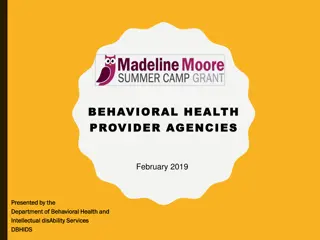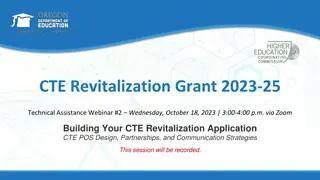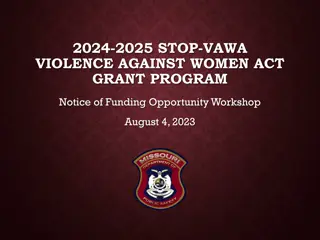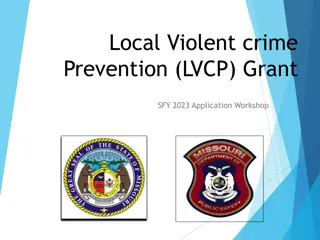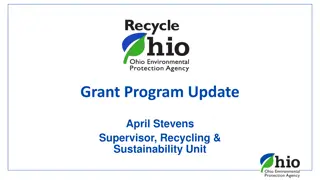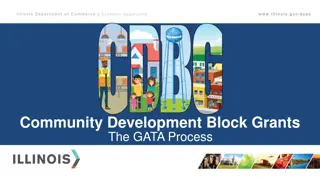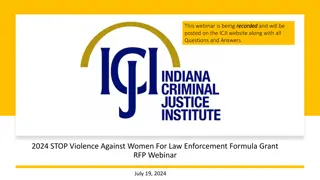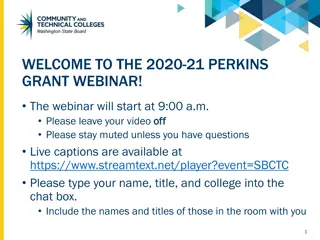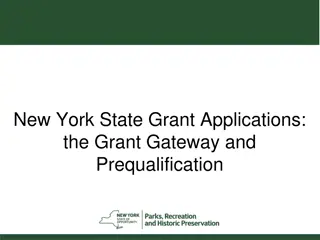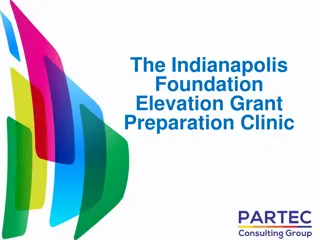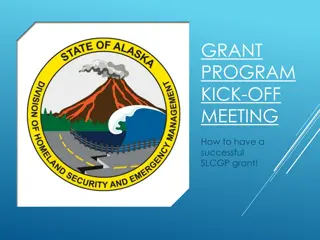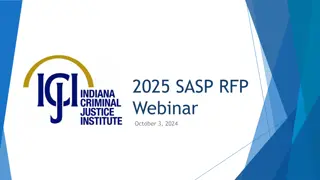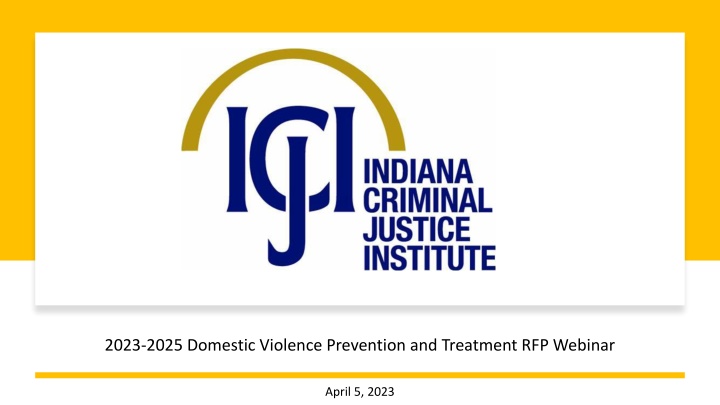
2023-2025 DVPT Grant Program Overview
The 2023-2025 Domestic Violence Prevention and Treatment (DVPT) grant program in Indiana aims to support centers, training programs, and initiatives for preventing and treating domestic violence. Eligible entities can receive funding for services like emergency shelter, crisis assistance, transportation, information, referral, and victim advocacy. The grant application process, timeline, and key requirements are detailed in the program guidelines.
Download Presentation

Please find below an Image/Link to download the presentation.
The content on the website is provided AS IS for your information and personal use only. It may not be sold, licensed, or shared on other websites without obtaining consent from the author. If you encounter any issues during the download, it is possible that the publisher has removed the file from their server.
You are allowed to download the files provided on this website for personal or commercial use, subject to the condition that they are used lawfully. All files are the property of their respective owners.
The content on the website is provided AS IS for your information and personal use only. It may not be sold, licensed, or shared on other websites without obtaining consent from the author.
E N D
Presentation Transcript
2023-2025 Domestic Violence Prevention and Treatment RFP Webinar April 5, 2023
Thanks for joining us today: Thanks for joining us today: Please keep your lines muted during the presentation. Webinar is being recorded recorded. It will be posted on the ICJI website. Questions and Answers at the end. Feel Free to utilize the chat box during the webinar.
2023-2025 DVPT Grant Application Application opened: Monday, March 27th at 9 AM Application closes: Thursday, April 27th at 11:59 PM Applicants are strongly encouraged to submit applications 48 hours prior to the deadline. Award Period for DVPT: July 1, 2023 June 30, 2025 (24-month award period) Projects should begin on July 1, 2023 and must be in operation no later than 60 days after this date. Failure to have the funded project operational within 60 days from July 1, 2023 will result in the cancellation of the grant and the de-obligation of all awarded funds.
Accessing the RFP Located on ICJI Website CJI.in.gov Victim Services Domestic Violence Prevention and Treatment (DVPT) grant DVPT RFP 2023 https://www.in.gov/cji/victim-services/dvpt/
Overview: The Domestic Violence Prevention and Treatment (DVPT) grant fund is established in Indiana Code and may be used in the following ways: (1) to establish and maintain domestic violence prevention and treatment centers, (2) to develop and establish training programs for professionals, paraprofessionals or volunteer personnel who are engaged in areas related to the problems of domestic violence, and (3) to develop and implement the means for prevention and treatment of domestic violence.
Entities Eligible for DVPT Funding: An entity is eligible to receive funding if it furnishes, agrees to furnish, or arranges with a third party to furnish all the following services: (1) Emergency shelter provided either at the center or by arrangement at temporary residential facilities available in the community, that are available to a person who fears domestic or family violence. (2) A twenty-four (24) hour telephone system to provide crisis assistance to a person threatened by domestic or family violence. (3) Emergency transportation services, if necessary, to aid victims of domestic or family violence. (4) Information, referral, and victim advocacy services in the areas of health care assistance, social and mental health services, family counseling, job training and employment opportunities, legal assistance, and counseling for dependent children.
Priority Areas The state will give special emphasis to the support of community-based projects of demonstrated effectiveness that are carried out by nonprofit private organizations and that have as their primary purpose the operation of shelters for victims of family violence, domestic violence, and dating violence, and their dependents; or provide counseling, advocacy, and self-help services to victims of family violence, domestic violence, and dating violence, and their dependents. In addition to prioritizing funding for the personnel costs to provide these services, two other supports will be prioritized: Mobile Advocacy involves providing services to clients in locations that they identify as safe within their communities rather than expecting that they should start with shelters. Since mobile advocacy prioritizes understanding the specific needs of the survivor, it can include many different types of services such as community-based advocacy, housing support, and flex funding. Flex Funding are funds that service agencies can provide to survivors to allow them to secure basic needs essential for keeping themselves and their children safe, such as initial housing costs (deposits and first month s rent), utility payments, relocation expenses, transportation costs, debt related to the abuse, nutrition assistance and costs related to safety/security.
Allowable Activities o Supporting the operations and service delivery of residential and nonresidential domestic violence programs statewide. These activities include: Providing emergency shelter. Shelter may be provided either at a residential facility or by arrangement at temporary residential facilities available in the community. Providing 24-hour crisis intervention, information and referral, support, and advocacy. Providing emergency transportation services. Providing information, referral, and victim services in the areas of housing, health care advocacy, social and mental health services, family counseling, job training and employment opportunities, and legal assistance and counseling for dependents. Retaining and/or expanding agency staffing to support program activities. o Expanding basic domestic violence services to underserved and unserved communities. Basic services may be provided by shelters, satellite offices operated by an existing program, and/or non-residential service providers who provide advocacy services.
Allowable Activities Cont. o Developing and establishing a primary prevention initiative that addresses risk and protective factors related to domestic violence. o Developing and establishing training programs for professionals, paraprofessionals, or volunteers who are engaged in the areas related to the prevention or intervention of domestic violence. Training includes training others in the community as well as staff and volunteer training. o Developing a coordinated effort to address the system response to domestic violence. A system response can include: Collaboration with local or statewide agencies and organizations that interface with survivors. Providing technical assistance to agencies that work with survivors. Participating or collaborating with a local task force, commission or advisory council to address domestic violence. o Increasing organizational capacity through meeting data collection and technology needs. o Providing or coordinating language access services for victims/survivors of domestic violence.
Allowable Costs Personnel, employee benefits, and cost of supplies, equipment and travel to perform the following activities are allowable costs. Overtime or on call time for grant funded staff is an allowable cost, but to claim the different rate of pay, there must a separate line item in the budget that includes the rate of pay for that time. Prevention services such as outreach, parenting, employment training, educational services, promotion of good nutrition, disease prevention, and substance abuse prevention. Counselingwith respect to family violence, counseling or other supportive services provided by peers, either individually or in groups, and referral to community social services. Safety plan development and supporting the efforts of victims to make decisions related to their ongoing safety and well-being. Culturally and linguistically appropriate services such as interpreters and/or having documents translated into other languages.
Allowable Costs Cont. Technical assistance with respect to assisting victims with obtaining financial assistance under Federal and State programs. Housing advocacy to assist in locating and securing safe and affordable permanent housing and homeless prevention services. Medical advocacy including referrals for healthcare services (including mental health and alcohol and drug abuse treatment) but shall not include reimbursement for any healthcare services. Legal advocacy to provide victims with information and assistance through the civil and criminal courts, and legal assistance. Children s counseling and support services, and childcare services for children who are victims of family violence or the dependents of such victims, and children who witness domestic violence.
Allowable Costs Cont. The following are other expenses that are allowable for reimbursement when providing services to victims of domestic violence: Operating expenses (rent, utilities, etc.) of victim service facilities at a prorated amount. Supplies for facilities including office supplies, cleaning supplies and victim supplies (clothing, toiletries, etc). Emergency flexible fundingto support survivors immediate financial needs. A victim financial assistance request form must be submitted with all requests for reimbursement. An example of a financial assistance request can be found on CJI website.
Unallowable Costs Direct financial assistance to a client such as cash or gift cards. Food and beverages except emergency food and beverage for victims. Lobbying. Fundraising (including financial campaigns, endowment drives, solicitation of gifts and bequests, and similar expenses incurred solely to raise capital or obtain contributions) and time spent procuring funding including completing federal and state funding applications. Purchase of real estate. Construction and physical modification to buildings, including minor renovations (such as painting or carpeting). Purchase of vehicles. Indirect cost rate and/or de minimis rate.
All grants from ICJI Victim Services are reimbursement grants, which means that agency must first occur the expense prior to CJI reimbursing for the expense. Verification of expenses along with verification of payment of expenses must be provided to ICJI on a monthly or quarterly basis prior to reimbursement of expenses by ICJI. IMPORTANT NOTES This grant is governed by the 2023-2024 state budget, which is up for consideration in 2023. Therefore, all awards are subject to change and may be modified, reduced, or discontinued depending on the funding allocated during the upcoming legislative session.
Initiating an application Log into your IntelliGrants account If you do not have an account, then you can obtain one on the home screen of intelligrants (New User?) On the MY HOME page access the VIEW AVAILABLE PROPOSALS section Click on VIEW OPPORTUNITIES Intelligrants will take you to the My Opportunities page Access the 2023 DVPT Grant Application Select Apply Now https://intelligrants.in.gov
Forms that need to be completed Contact Project Information Programmatic Information Problem Statement & Analysis Goals, Objectives, and Outcomes Program Description Evidence Based/Best Practices Use of Volunteers Budget Budget Narrative Attachments
Contact Forms that need to be completed Cont. Points of Contact for the grant (CJI will notify these individuals of your award notice) Project Information SAMs Registration must be up-to-date Audit If you receive more than $750,000 in federal grant funds, you are required to have an audit. This will be requested if CJI is aware that you receive more than $750,000. All government agency s audits are included in the County audit and should all have one attached Programmatic Information Information about your proposed DVPT grant Problem Statement & Analysis
Goal, Objective, and Outcomes Forms that need to be completed Cont. The goal should directly address the problem identified in the Problem Statement. Objectives are the steps needed to achieve goals. Objectives should be concrete, action-oriented, measurable and Specific, Measurable, Achievable, Realistic, Timely (SMART). Example of Objective: By September 2022, a minimum of 50 culturally and linguistically appropriate support groups for survivors of domestic violence will be provided. Outcomes measure objectives and are criteria for how the program is deemed to be effective. Example of Outcome: 85% of participants will indicate that they have learned ways to act in their own best interest. Program Description What? Who? Where? Why? When? How? Evidence Based/Best Practice Use of Volunteers
Budget Requirement The submitted budget will need to reflect Year 1 and Year 2 of funding on every expense. Funds designated under Year 1 must be spent in Year 1 and will not be available in Year 2. The same is true of Year 2. Funds designated under Year 2 will not be available in Year 1. During any Project Modification Request, funds will not be able to be moved between years.
Budget Narrative Be sure all items in the Budget are included in the Budget Narrative. Ex: Office Supplies (copy paper, pencils, pens) Grant reviewers are not are not required to contact you for clarification. Any missing information in this section may disqualify that budget item for funding.
Total Agency Budget Found on ICJI s website (https://www.in.gov/cji/victim- services/resources/) Subgrantee Basic Budget (Nonprofit Applicant Budget Form) Sustainability Plan Your plan to maintain the program once the grant funds expire Timeline Outlining the completion of the project/ or expenditures of the grant funds Letters of Endorsement For this program specifically Miscellaneous Job Descriptions If applicable, attach any other requested information REQUIRED ATTACHMENTS
Technical Assistance For technical assistance contact the ICJI Helpdesk at CJIHelpDesk@cji.in.gov. Help Desk hours are Monday Friday, 8:00 am to 4:30 pm ET, except state holidays. ICJI is not responsible for technical issues with grant submission within 48 hours ICJI is not responsible for technical issues with grant submission within 48 hours of grant deadline. of grant deadline. For assistance with any other requirements of this solicitation, please contact The Victim Services Division at ICJI.
Thanks for attending! Presenter: Dalayna Anderson, Victim Services, Program Specialist DaAnderson1@cji.in.gov 317-232-3482

